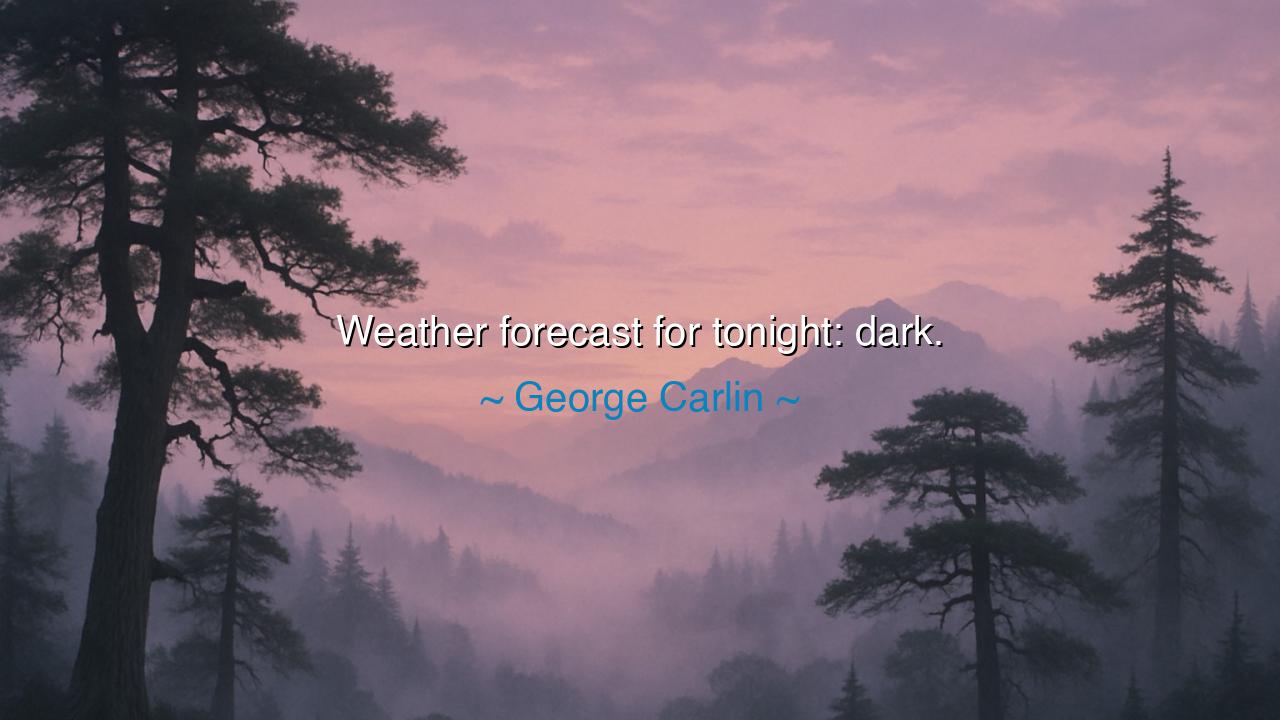
Weather forecast for tonight: dark.






"Weather forecast for tonight: dark." – George Carlin
In the boundless expanse of the human experience, there are moments when humor becomes the sharpest tool for cutting through the illusion of complexity. The words of George Carlin, in their simplicity and wit, carry a profound lesson about the nature of human expectations and the tendency to make even the most mundane into something grand. By offering a forecast of something as elementary as darkness, Carlin points to a deeper truth about the human condition: the unpredictability of life and the often absurd nature of our attempts to forecast or control it. The weather, like life itself, is not something that can always be neatly packaged into predictions. Sometimes, what we expect is as simple as the inevitable passing of the day into night.
Consider the ancient oracle of Delphi, where those seeking knowledge would come in hopes of receiving divine wisdom about the future. The answers given were often cryptic, full of riddles, designed to remind the seeker that the future could never be fully understood or controlled. Even the gods, in their wisdom, could only offer glimpses into what might be, leaving much to the mysteries of fate and chance. In much the same way, Carlin’s forecast is not a complicated prediction but a truth that everyone already knows—when the sun sets, it becomes dark. It is a reminder that, despite our desire to plan and predict, some things are beyond our comprehension or control, and often the simplest truths are the most profound.
In the ancient Greek tradition, stoicism taught that one must accept the things that are outside of their control, focusing instead on cultivating inner peace in the face of life’s uncertainties. The weather, with its changeable nature, is a perfect symbol of the things we cannot alter, yet still, we often try to predict and manage it. Much like the seasons, which turn with inevitable regularity, the night follows the day, and Carlin’s humor highlights our human tendency to complicate the simplest realities. The darkness that is promised each night is both a comfort and a reminder that we cannot hold back the forces of nature, nor can we truly predict what comes next.
Consider the story of Cassandra, the tragic figure in Greek mythology. She was blessed with the gift of prophecy but cursed to have no one believe her. Her warnings about the future—her predictions of doom and disaster—were disregarded by those around her, despite her accurate foresight. In her case, the truth she spoke was dismissed as absurd, just as the simple truth of darkness is often ignored in favor of grand, complex explanations about the future. Yet, Cassandra’s tragedy lies in the fact that despite her knowledge, she could do nothing to change what was to come. Similarly, Carlin’s weather forecast serves as a playful reminder that, no matter how much we seek to predict or control our surroundings, there are some things—like the night—that we cannot alter.
The message Carlin delivers is both humorous and deeply philosophical. The weather, like life, can be as predictable as the coming of night. However, we often complicate matters, especially in an age where we try to control everything. Our attempts to predict every detail of the future, to forecast it with the precision of a modern weather report, are often met with failure. Life, like the setting sun, has its own rhythm—unpredictable, inevitable, and at times, dark. The beauty of Carlin’s words lies in their simplicity, for they remind us that some things are beyond our control, and that sometimes it is enough to accept that the night will come, whether we forecast it or not.
As we reflect on the wisdom hidden in Carlin’s humor, we must understand that darkness is not merely a literal absence of light, but a metaphor for the unknown—the uncertainties that lie ahead in life. Predictions about the future, whether in the form of weather forecasts or grand schemes, often fail to take into account the mysteries that the universe holds. Life, like the coming of night, has its own schedule, one that we cannot predict, control, or delay. What we can control is our response to it, our acceptance of it. The lesson Carlin offers is one of acceptance: that sometimes the best we can do is to acknowledge that life will unfold as it will, and the future, in all its uncertainty, will come to us, whether we are ready or not.
Thus, in our own lives, let us learn to embrace the simplicity of the truths that surround us. Let us not waste our energy in trying to predict every storm, every sunset, or every shift in the winds of time. Instead, let us find peace in accepting that, like the night, there are some things that are inevitable. The darkness that falls each evening is not something to be feared, but something to be acknowledged as part of the natural order. And in doing so, we learn to navigate the uncertainties of life with grace, humor, and wisdom, remembering that not everything needs a complicated forecast. Sometimes, the most profound truths are the ones we already know—life moves on, and the night will come.






AAdministratorAdministrator
Welcome, honored guests. Please leave a comment, we will respond soon